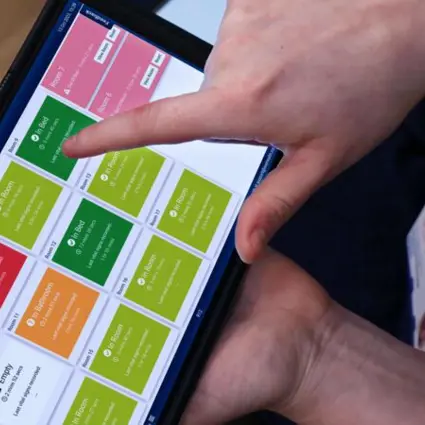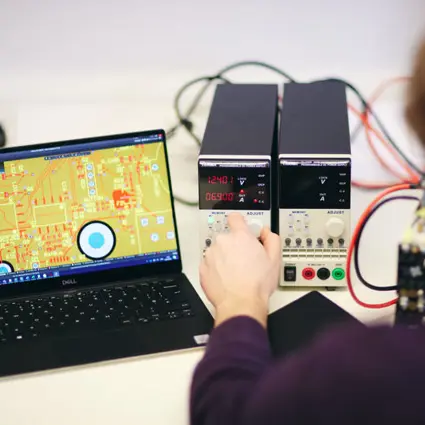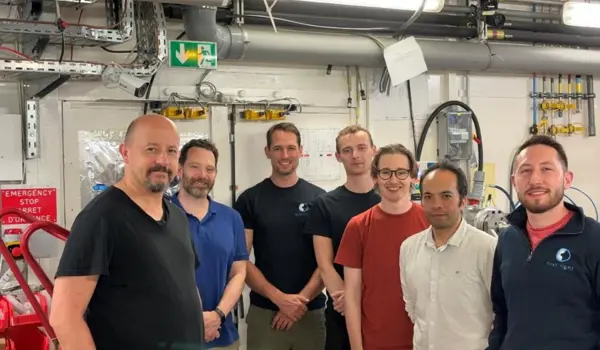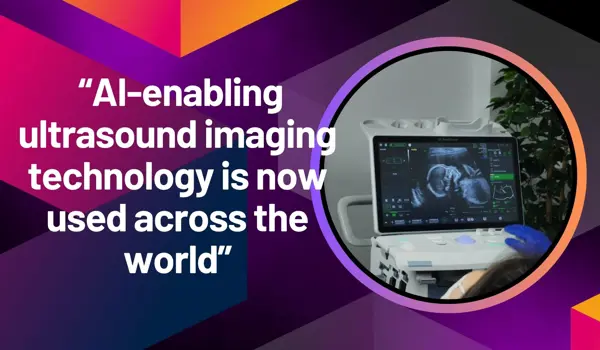Information about the Spinout Companies that have originated from The Department of Engineering Science at the University of Oxford
Spinout Companies
Turning Research Into Impact
Spinouts are companies formed based on academic research generated within and owned by the University. Spinouts are often better able to turn university research into real-world impact than internal departments, due to their dynamic nature and ability to make speedy decisions. The creation of new spinout companies also channels millions of pounds back into University research, benefits local economic development and has created many new jobs in the region.
Over 45 spinout companies have their origins in Department of Engineering Science research since the 1970s.
Engineering Science Spinouts
2d3
Since 1999, 2d3 has supplied a range of computer vision products, all based on "3D from the moving image", mainly to the film and television production industries. The company's original product, boujou, the world's leading automatic camera tracker, is now used by most film and video post-production companies to generate visual effects requiring accurate registration of real and virtual images.
Amber Therapeutics
Amber Therapeutics was founded in 2021 by Aidan Crawley, Professor Tim Denison (Institute of Biomedical Engineering), Stefan De Wachter and Charles Knowles with a mission to develop and deliver breakthrough neuromodulation therapies that can fundamentally transform outcomes in areas of unmet clinical need. They have since grown into a multidisciplinary team, combining deep medical device experience with a culture and mindset focused on transformational innovation. Amber UI is the company’s first therapy, aiming to restore normal physiological function in women suffering with mixed urinary incontinence.
Aurox Ltd
Aurox Ltd is a leader in the design and manufacture of innovative optical imaging equipment. In particular it has brought affordable confocal microscopy to a wider user community. The company has won an R&D 100 award for its products as well as an Institute of Physics award for Innovation together with a Queen’s Award for Enterprise.
Brill Power
Brill Power improves battery system performance with intelligent control technology. It is a clean-tech start-up that makes lithium ion batteries more reliable and sustainable. Brill Power’s intelligent control system extends the lifetime of multi-cell batteries while maintaining high performance.
Circadian Therapeutics
Circadian Therapeutics develops drugs that derive their therapeutic effects through modulation of the control of sleep and circadian rhythms. Circadian Therapeutics is aiming to replace hospital-based, expensive diagnostics through the development of a home-based ambulatory electroencephalogram (EEG) device that will provide accurate and minimally intrusive measurement of brain function and circadian rhythms.
CN Bio Innovations
CN Bio Innovations (abbreviated to CNBIO), formerly Zyoxel Ltd, is part of the Hong Kong-based, CN Innovations Holding Limited (CNI). CNBIO provide human biomimetic platforms for the testing and development of therapeutics for serious human diseases. Working closely with academic pioneers in the bio-engineering field, CNBIO is developing next generation tissue and disease models which will improve the quality of life for millions of people around the world by fast tracking breakthrough therapies to market.
Deontics
Deontics are a world-leading Artificial Intelligence company with Clinical Pathway and Clinical Decision Support Systems (CDSS) products. Our highly sophisticated software tools and applications can be used in any clinical environment whether primary, secondary or tertiary care. Our technologies allow us to build clinical pathways, workflow systems and clinical decision support systems very quickly and without the need to write computer code. Our systems are designed to promote evidence-based and personalized medicine and have been shown to increase compliance with clinical guidelines.
Eykona Technologies Ltd
Eykona Technologies sells a 3D camera aimed at the imaging of external wounds and designed to be used within a sterile environment. It uses patented technology developed by Prof Ron Daniel at Oxford University and enables clinicians obtain accurate 3D estimates of a wound’s volume so that the effectiveness of the treatment regime can be assessed.
First Light Fusion
First Light Fusion Ltd was spun out from the University of Oxford in July 2011, with seed capital from the IP Group plc, Parkwalk Advisors Ltd and a number of Angel investors. Until May 2014, the company was named Oxyntix Ltd.
Based in Oxford, First Light Fusion directly employs a team of engineers and physicists, as well as collaborating closely with a number of academic organisations, including the University of Oxford, Warwick University, UCL and Imperial College, London.
Fuel3D
Fuel3D is a developer of advanced 3D scanning systems and solutions. Originally developed for the medical imaging sector, the Fuel3D technology has been adapted for the broader 3D market, with the goal of bringing the benefits of point-and-shoot 3D imaging to consumers, professionals and businesses.
Ground Truth Labs
Ground Truth Labs was established in 2019 to work to improve disease diagnosis through digital pathology. Providing analysis and other tools for histology research to manage and build cohorts with remote teams; it annotates whole slide images and provides access to on-demand, high-quality predictive models.
Intelligent Ultrasound
Intelligent Ultrasound develops software that significantly improves the quality, reliability and diagnostic power of medical ultrasound scans.
iotaSciences
iotaSciences is focussed on developing and delivering solutions to life scientists and the biomedical sector based on innovative fluid shaping technologies.
Kepler Energy Ltd
Kepler Energy is a privately financed company set up to develop, install and operate commercial tidal energy arrays using an innovative, patented third generation transverse horizontal axis turbine, developed at Oxford University, specifically designed for use in low tidal velocity flows.
Metaboards
Metaboards uses metamaterials to transmit and control magneto inductive waves (MIW) across surfaces. The first application of the technology enables simple and inexpensive wireless transfer of power and data between electronic devices.
Microbial Solutions Ltd
Microbial Solutions Ltd is a spin-out which specialises in sustainable treatment of operational exhausted metal working fluids generated by engineering workshops. The technology is bioreactor based and exploits the natural ability some specialist microorganisms to biodegrade the waste, enabling water recycling on-site. The company is also focused on design of new metal working fluids formulations and diagnostics of potential microbial pathogens inhabiting engineered system.
Mind Foundry
Mind Foundry was born from the University of Oxford and is now one of the UK’s leading AI companies. Their mission is to create a world humans work together to aid the decision making needed to build a better, safer, and cleaner world. Presently they offer three software products; Analyze, Optimize and Horizon, as well as a myriad of custom services.
Mirada Medical
Mirada Medical is an internationally recognised brand in advanced medical imaging. The company develops high value clinical software applications, which are used across diagnostic radiology, nuclear medicine, radiation oncology, tumour board and elsewhere.
Mirada specialises in simplifying technically complex image quantification, allowing clinicians to more confidently diagnose disease, assess response to treatment and plan radiation therapy or surgical intervention.
NavLive
NavLive, was spun out of Oxford Robotics Institute in 2022 to commercialize advanced 3D mapping technology. This technology can enable real-time monitoring of construction, nuclear and industrial facilities. NavLive uses real-time multi-sensor fusion of vision, lidar and other sensor as well as highly positioning algorithms to build 3D models of indoor and outdoor environments in real-time. The tech can infer change and provide data to facility or site decision-makers enabling more efficient building projects. During the development of the technology the team reconstructed Oxford's famous Sheldonian Theatre in 3D. The company was founded by Prof. Maurice Fallon and Dr. David Wisth.
Navetas Energy Management
Navetas is a powerful force in energy management, with an enviable reputation for helping utilities, companies and individuals find innovative new ways to reduce and manage energy consumption.
Navetas helps empower individuals and companies to make better energy choices. Our technology can help utilities, service providers and organisations offer a better customer experience, improve energy management awareness and meet the complex challenges of the changing energy landscape.
OBS Medical
OBS Medical is a medical device company which supplies patient monitoring and mobile-based software solutions to hospital wards, primary care practices, and pharmaceutical companies running clinical trials.
Odqa
Industrial heat is responsible for over 20% of global CO₂ emissions, yet remains one of the least decarbonised sectors. Odqa was founded to address this gap by Professor Peter Ireland (Oxford Thermofluids Institute) and Oxford MBA Gediz Karaca. Together, they applied aerospace heat-transfer science to a new frontier: solar thermal energy.
Opsydia
Opsydia are specialists in designing bespoke optical systems and laser fabrication processes for complex and unique ideas. Utilising our decades of cutting-edge photonics research and extensive industrial experience, we perform otherwise impossible materials processing tasks.
OrganOx Ltd
OrganOx Limited was established to improve both the quality and quantity of organs for transplantation. Over 6000 livers are discarded worldwide each year because of limitations of current cold storage technologies. The OrganOx technology allows livers to be preserved for 24 hours, twice as long currently possible, in a functioning state outside the body. This could enable organs currently deemed unsuitable for transplantation, to recover to an acceptable standard for transplant.
Orthoson
Established in 2015, Orthoson is developing a treatment of spine conditions to reinstate the height and mechanics of a degenerated disc, spun out from research by Professor Constantin Coussios. The technology uses precision therapeutic ultrasound together with an injectable in-situ curing hydrogel implant to provide a disruptively cost-effective alternative to current surgical options.
Oxa (formerly Oxbotica)
Oxa is an autonomous vehicle (AV) software company, founded in 2014 and is a spin-out from Oxford University's acclaimed Oxford Robotics Institute - the first group to deploy an autonomous car on UK roads. The software company specialises in universal autonomy, building software for real-world autonomous vehicle applications, drawing on its heritage of world leading research into artificial intelligence, robotics and computer vision. Oxa is working to build an eco-system that supports the adoption of AVs, creating solutions that allow robots, vehicles, machinery and people to precisely map, navigate and actively interact with their surroundings, delivering new capability and precision to a wide range of applications. Its 3D imaging and localisation solutions operate on-road and off-road without any need for GPS and are suitable for use in applications ranging from hand held survey devices to autonomous vehicles.
OxeHealth
Oxehealth gives carers and custodians more time for hands on care where and when it’s needed most. It is an assistant for when you can't be there, paying attention to every room. The software as a service solution generates the alerts and reports carers and custodians need, seamlessly slotted into their existing workflow. It is currently provided to police, mental health, acute hospital, care home and home care customers. Spun out from Professor Tarassenko’s group at the IBME, Oxehealth’s technology can monitor human activity and behaviour (available now) & vital signs (proven in research deployments, going through medical device certification, not yet placed on the market) using proprietary algorithms which harness deep learning, computer vision and signal processing techniques.
OXEMS Ltd
OXEMS is a spin out company utilising research outputs from EPSRC funded research in the area of electromagnetics for civil engineering applications under a programme called "Mapping the Underworld". OXEMS offers a complete solution to the problems of locating, identifying and strategic management of underground assets. It utilises patented tagging technology combined with GPS, mobile communications and intelligent database management systems to provide utility companies with the ability to automatically tag and pinpoint globally the location of pipes and cables down to a depth of 2m with an accuracy of 15%.
Oxford Endovascular
Oxford Endovascular are developing a novel treatment for treating brain aneurysms. The Oxford technology uses a special laser-cut metal alloy which has a shape-memory. It can be posted into a catheter during surgery, inserted into the brain and opened up into a tiny tube mesh (‘flow diverter’) that fits into the natural shape of the blood vessel. This diverts the blood away from the aneurysm, allowing it to heal.
Oxford Enhanced Medical Limited (OxEML)
OxEML has raised £1 million from a high net worth Chinese investor to develop an imaging technology which could help doctors detect cancers, particularly prostate and liver tumours. Early diagnosis of cancer has been shown to save lives, and the Oxford technology will allow for improved visualisation of tumours for earlier detection.
Oxford Flow
Oxford Flow, incorporated in September 2015, designs and manufactures innovative pressure control equipment using technology developed at Oxford University. Oxford Flow's Pressure Reducing Valves and Gas Pressure Regulators can significantly reduce costs for energy, water and process industries.
Oxford MEStar
Oxford MEStar is a rapidly grown, energetic company specializing in translational and regenerative medicine. With our core technical expertise in bioprocessing, bioengineering and bio-manufacture, we have developed enabling technologies for tissue engineering and stem cell therapy. Also, we are able to reach an extensive network of investors, bio-tech businesses, GMP manufacturing facilities, and marketing and distribution channels in China. It constitutes one of the unique strengths of Oxford MEStar, which allows us to quickly respond to market demand and offer practical solutions to our clients for their products’ improvement. Combining our technical expertise and our ease of access to the market, we are actively seeking opportunities for technology transfer between the UK and China.
Oxford Molecular Biosensors
Oxford Molecular Biosensors Ltd utilises synthetic biology techniques to design ultra-sensitive biosensors, i.e. detection tools, for environment, industry and water. After winning an Innovate UK grant and a contract with a large utilities company, OMB are now developing new biosensors & testing platforms to detect various water quality parameters and toxicity in industrial effluents, as chemical methods alone cannot report on the combined effect of complex mixtures. OMB also offers a set of pollution management tools based on mathematical models of rivers globally in order track pollutants and model impacts of environmental change.
Oxford nanoSystems
Based out of the European Space Agency Business Incubation Centre in Harwell Oxford, Oxford nanoSystems are using emerging technologies to refine longstanding heat transfer techniques for consumer and industrial platforms.
Powered by these as well as rare market access, the vision of OnS is to bring existing systems into the 21st century, improving their efficiencies, cost structures, and service requirements.
OxMet Technologies
With an established portfolio of IP encompassing alloy design methods, proprietary software and optimised alloys, OxMet is targeting a broad range of market sectors including: aerospace, automotive, defence, medical-devices, energy and consumer goods.
Oxonica
Oxonica Limited is an advanced materials business which licences patents related to nanomaterials. Such agreements exist with Croda Europe Ltd in the UK and BD (formerly Becton, Dickinson) in the USA.
OXSIGHT
OXSIGHT is an AI Vision company established in 2016 as a spinout from Oxford University, producing smart glasses (Augmented Reality, AR and Mixed reality, MR) powered by machine learning and deep learning computer Vision platforms. Currently being sold to improve the life of sight impaired users, helping them to identify faces, text, colours and objects in real time. OXSIGHT has produced 3 devices to date. OXSIGHT Crystal & Prism focusing on enhancing any remaining central vision to compensation for peripheral vision loss (conditions such as Retinitis Pigmentosa, often referred to ’tunnel vision' ), and OXSIGHT Onyx, which enhances remaining peripheral vision to compensate for loss of central vision (conditions such a Age Related Macular Degeneration, Diabetic Rentinopathy, etc).
Oxsed
Oxsed was founded in April 2020 by Professors Zhanfeng Cui and Wei Huang from the Engineering Science Department and the Oxford Suzhou Centre for Applied Research. They devised a rapid RNA test which can detect whether a person is infected with the Covid-19 virus and is still infectious. It does not require the use of specialist equipment and can be used by anyone. Users need only transfer samples from mouth or nose swabs, or saliva, into a test tube supplied with the test, containing all the necessary reagents. The test tube is then heated to 65°C for 30 minutes, after which results are shown by a simple colour change, allowing quick and easy interpretation. In place of the commonly used polymerase chain reaction (PCR) platform, the test uses reverse transcription loop-mediated amplification (RT-LAMP) to detect viral RNA. The team of Oxford University engineers overcame huge challenges to develop RT-LAMP into a robust, sensitive, specific and reliable method to detect SARS-CoV-2 and eliminate the common false positive issue and unspecified reactions.
Oxford SimCell
Oxford SimCell was created by Professors Zhanfeng Cui and Wei Huang in 2020. It develops simple cells or 'SimCells' as a new platform for synthetic biology. SimCells act as artificial cellular machines that are easily modified and engineered to perform a variety of functions. By combining cells' original biomolecular machinery with synthetic genomes (gene-circuits), SimCells can act as agents for drug delivery, biomanufacturing, and biosensors.
OxVent
OxVent is a rapidly deployable and scalable low-cost mechanical ventilator specially designed for Covid-19 in 2020. Within a week of the UK Ventilator challenge being announced by the government, a team of engineers and medics from Oxford and King’s College London had produced a prototype. Although not ultimately required in the UK, the project has resulted in a brand new low-cost medical device that is ready to be deployed in Low to Middle Income Countries. Most of the ventilator’s 100 or so components are available off the shelf, and it has a much lower oxygen requirement than standard pressure control ventilators. OxVent is reaching agreements with manufacturers and distributors in LMICs for the device for use in Covid19, and in preparedness for future pandemics.
OxSonics
OxSonics' mission is to provide economic and scalable life-changing treatments to solid tumour cancer patients.
OxSonics' drug delivery platform, SonoTran, has the capability to overcome one of the greatest limitations facing solid tumour cancer therapy: delivering drugs throughout tumour volumes including to those areas that lie farthest from blood vessels.
Oxyntix Ltd
Oxyntix Ltd is a research-intensive company, developing and commercialising new technologies in energy and process engineering, among other fields. A core technology they are promoting involves generation of extremely high temperatures, pressures and densities originating from fully controlled, optimised and scalable bubble collapse processes.
Particle Therapeutics
Particle Therapeutics is an Oxford-based drug delivery company developing innovative particle formulation and drug delivery technologies to improve the efficacy and administration of a range of pharmaceuticals.
PowderJect Phamaceuticals
Originally spun out in 1993, PowderJect Phamaceuticals is a vaccine, drug and diagnostics delivery company specialising in the needle-free, pain-free injection of drugs, biophamaceuticals, conventional and DNA Vaccines and diagnostics in dry powder form. In 2003, PowderJect was acquired Chiron Corporation and was subsequently bought out by Novartis Vaccines and Diagnostics.
PrOXisense
Specialising in advanced sensors, diagnostics and optimisation systems. PrOXisense applies technology to allow the owners and operators of complex systems and machines to predict and prevent events that potentially have a adverse effect on the longevity and performance of their assets. We predict and prevent downtime & equipment failure, improve performance & efficiency of complex equipment.
Qdot
Qdot Technology was founded in 2020 by Dr Jack Nicholas, Dr Holt Wong and Prof Peter Ireland from the Oxford Thermofluid Institute. After first supporting the UK Fusion industry in managing the extreme heat in Tokamak reactors, the founders turned their attention to clean aerospace where thermal management is a critical performance enabler, developing a hydrogen-hybrid powertrain that’s scalable from large drones to commuter aircraft.
Run3D
Run3D provides an accurate and objective assessment of your biomechanics in order to understand the root-cause of injury and provide you with an evidence-based, long-term solution to the problem.
Their expertly trained clinicians take scientific measures of your 3D gait biomechanics, muscular strength, flexibility and alignment and use the information to create a personalised and effective rehabilitation programme.
Seloxium
Seloxium, a 2022 spinout company from the Engineering Science Department, is developing a multi-patented ‘selective flocculation’ technology, called SelectalTM, to change the way valuable metallic resources are mined, refined, recycled, and processed, to offer a more sustainable and environmentally friendly source of metals. Valuable and strategically important metals (e.g., gold, platinum, rare-earth metals) are often found among the harmful contaminants contained in wastewaters, but are difficult and costly to remove using conventional approaches. Such metals are generally not recovered and recycled effectively but instead discharged and lost. Seloxium’s academic founder and the co-inventor of SelectalTM is Associate Professor of Engineering Science and chemical engineer, Nick Hankins.
t+ Medical
t+ Medical provide an innovative range of telehealth solutions designed to empower patients, nurses, and doctors to manage long-term conditions more effectively. Our remote-patient-monitoring systems use mobile telehealth to reduce costs related to clinic & hospital admissions and improve nurse efficiency.
Xerion Healthcare
Xerion Healthcare is seeking to commercialise Dr Helen Townley’s Research Group’s work into the use of nanoparticles in cancer for therapy, imaging and drug delivery. The small size of nanoparticles means they can passively accumulate in tumours due to the enhanced permeation and retention (EPR) effect, where certain sizes of molecules accumulate more in tumour cells than in normal tissue.
YASA Motors Ltd
YASA Motors Ltd is a dynamic and innovative electric motor company bringing a new generation of high power and high torque density electric motors to market.
We have developed class leading axial flux traction motors for use in both Automotive (EV's & HEV's) and also Industrial applications.







